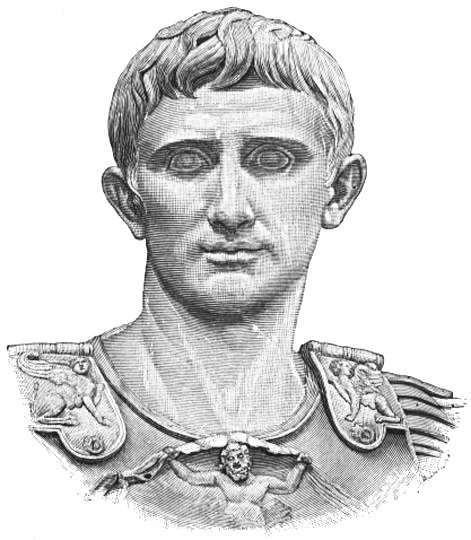Augusto foi o fundador do Império Romano e seu primeiro imperador, governando de 27 a.C. até sua morte em 14 d.C.. Nascido Caio Otávio, pertenceu a um rico e antigo ramo equestre da família plebeia dos Otávios. Depois do assassinato de seu tio-avô Júlio César em 44 a.C., o testamento de César nomeou Otávio como seu filho adotivo e herdeiro. Junto com Marco Antônio e Lépido, formou o Segundo Triunvirato e derrotou os assassinos de César. Após a vitória na Batalha de Filipos, os três dividiram a República Romana entre si, passando a governar como ditadores militares. O triunvirato foi posteriormente posto de lado sob as ambições conflitantes de seus membros: Lépido foi exilado e despojado de sua posição e Marco Antônio cometeu suicídio após sua derrota na Batalha de Áccio em 31 a.C..
Após o fim do Segundo Triunvirato, Augusto restaurou a fachada externa de república livre, com o poder governamental investido no senado romano, os magistrados executivos e as assembleias legislativas. Porém, na realidade, manteve seu poder autocrático sobre a República como um ditador militar. Por lei, reteve um conjunto de poderes atribuídos vitaliciamente pelo senado, incluindo o comando militar supremo e aqueles de tribuno e censor. Criou o primeiro programa de previdência pública do mundo, assegurando a lealdade do exército, tornando-se algo que nenhum romano havia sido antes: o comandante em chefe de todas as Forças Armadas. Rejeitou os títulos monárquicos e em vez disso denominou-se "Primeiro Cidadão do Estado" . O quadro constitucional resultante tornou-se conhecido como o Principado, a primeira fase do Império Romano.
O reinado de Augusto iniciou uma era de relativa paz conhecida como Pax Romana . Apesar de contínuas guerras de expansão nas fronteiras imperiais e uma guerra civil de um ano devido à sucessão imperial, o mundo romano esteve praticamente livre de conflitos em larga escala por mais de dois séculos. Ele dramaticamente aumentou o império, anexando Egito, Dalmácia, Panônia, Nórica e Récia, expandindo as possessões da África e Germânia e completando a conquista da Hispânia. Além das fronteiras, protegeu o Império com uma região tampão composta por Estados clientes e fez paz com o Império Parta por vias diplomáticas. Reformou o sistema romano de tributação, desenvolveu redes de estradas com um sistema de correio oficial, estabeleceu um exército permanente e a guarda pretoriana, criou serviços oficiais de policiais e bombeiros para Roma e reconstruiu grande parte da cidade durante seu reinado.
Augusto morreu em 14 d.C., com 75 anos. Pode ter morrido de causas naturais, embora tenha havido rumores não confirmados de que sua esposa Lívia Drusa o teria envenenado. Foi sucedido como imperador por seu filho adotivo Tibério . Com 41 anos, foi o soberano com maior tempo de mandato em Roma.
Wikipedia
✵
63 a.C. – 19. Agosto 14 d.C.
